- Home
- Kristan Higgins
Pack Up the Moon Page 2
Pack Up the Moon Read online
Page 2
No. Josh’s job had been to find—or make—something that would cure her. Restore her. Keep her.
He had not done so.
A large picture of her was placed on the altar. It had been taken on their trip to Paris just before Christmas that first year they were married. Before they knew. Her red hair blew back from her face, and her smile was so full of fun and love and joy. He stared at that picture now, still stunned that he got to marry her. She was way out of his league.
The first time they’d met, he’d insulted her.
Thank God he’d gotten another chance. Not that God existed. Otherwise, she’d still be alive. Who the hell took someone like her at age twenty-eight? A merciful God? Fuck that.
It didn’t seem possible that she was gone forever. No. It seemed like Lauren, who had enjoyed childlike tricks such as hiding in the shower and jumping out at him as he brushed his teeth, could pull off the biggest trick of all—jump out from behind the altar and say, “Boo! Just kidding, babe!” then laugh and hug him and tell him she was just testing him these past few years. She’d never been sick at all.
Then again, she’d already been cremated.
Apparently, Jen was done, because she came down from the altar of the church and stood before him.
“Thank you, Jen,” he said woodenly. His mother, sitting beside him, gave him a nudge, and he stood up and hugged his sister-in-law. Former sister-in-law? That didn’t seem fair. He liked being related to Jen and her husband, Darius, not to mention their two kids. He even almost liked Donna, his mother-in-law, who, after a shitty start, had been great at the end there. When Lauren was actively dying.
Now, his wife was ashes inside a baggie in a metal container. He was waiting for the special urn to arrive from California, at which point he would mix her with an organic soil mix. He’d plant a tree in the bamboo urn, and Lauren would become a dogwood tree. Cemeteries were unsustainable, if beautiful, she’d said. “Besides, who wouldn’t want to be a tree? Better than compost.”
He could almost hear her voice.
Everyone began filing out of the church. Josh waited, being at the front of the church. His mom slid her arm through his. “Hang in there, honey,” she whispered. He nodded. They both watched as Ben and Sumi Kim, his mother’s best friends and next-door neighbors, went to the altar and stood in front of Lauren’s picture. Ben bowed from the waist, then knelt on the floor and pressed his forehead to it, then rose and bowed again while Sumi sobbed gently.
Josh had to cover his eyes for a minute at the reverence, the heartache in that gesture. Lauren had loved the Kims, who were essentially Josh’s second parents. Ben was the closest thing to a father he’d ever had. Of course Lauren loved them. She loved most people, and they all loved her right back.
The Kims came over, hugged him. Josh stood there with the three adults who’d raised him, all helpless now in the face of his loss.
No one could help him.
“You’ll get through this, son,” Ben said, looking him in the eye. “I know it seems like you won’t, but you will.”
Josh nodded. Ben wasn’t the type to lie. Ben gripped his shoulders and nodded back. “You’re not alone in this, Josh.”
Well. That was a nice thought, but of course he was alone. His wife was dead.
“Shall we head out, then?” the older man asked. Like his mother, Ben was good at giving Josh the cues he often needed in social situations. Not as good as Lauren, though.
Panic flashed painfully through his joints. What was he going to do without her?
“Let’s go, honey,” his mom said.
Right. He hadn’t answered. “Okay,” he said. It felt wrong, somehow, leaving the church. Ending the funeral.
There was a lunch after the service. So many flowers, despite Lauren’s wish that in lieu of, there’d be donations for the Hope Center, her favorite place in Providence, her hometown. Her workmates from Pearl Churchwell Harris, the architectural firm where she’d worked as a public space designer, were all here—Bruce, who’d been such a great boss to Lauren, crying as if he’d lost his own child. Santino and Louise, who’d gone on walks with Lauren to keep her lung capacity up. That shitty Lori Cantore, who’d asked if she could have Lauren’s office two years ago. Such a vulture, coming to the funeral when she’d been a pill in real life. He imagined grabbing her scrawny arm and dragging her out, but he didn’t want to make her the center of attention. This was Lauren’s funeral, after all.
And there were so many of Lauren’s friends—Asmaa from the community center; Sarah, her best friend from childhood; Mara from Rhode Island School of Design; Creepy Charlotte, the single woman who lived on the first floor of their building, and, Josh was almost sure, had been making a play for him since they’d met, wife or no wife. People from Lauren’s childhood, high school and college, teachers, classmates, the principal of Lauren’s grammar school.
Some people even came for Josh, having read Lauren’s obituary. Not exactly his friends . . . he didn’t have many of those. Lauren had been his friend. His best friend. Her family had welcomed him, but he was really just a phantom limb at this point. An amputation without her.
A short, stout woman with steel-gray curls came up to him. “I’m sorry for your loss,” she said. Her voice was familiar. He glanced at his mother, who gave a small shrug.
“Uh . . . how did you know Lauren?” he asked.
“I don’t. I work for you. I’m Cookie Goldberg. Your virtual assistant.”
“Oh! Hi. Uh . . . right.” Cookie lived in New York. Long Island. They’d never met face-to-face, though he’d seen her on Zoom and Skype often enough.
“Yeah, well, I’m . . . shit. I’m so sorry for you, Joshua. My heart is breaking for you.” Her raspy voice cracked, and she looked a little shocked at her own words. “Okay. I got a long drive home. Call me if you need anything.”
She turned and left.
“She works for you, but you didn’t recognize her? You only have one employee, Josh,” his mother chided gently.
“She’s out of context,” he said, sitting back down.
He didn’t eat, or maybe he did. Darius, Jen’s husband, got him a glass of wine, forgetting that Josh didn’t drink. Eventually, Josh got to hold Octavia. Was she still his niece? He was her dead aunt’s widowed husband. Did he still get to claim her and Sebastian? Was he still Uncle Josh?
Sebastian, age four, wailed, inconsolable despite Darius’s best efforts. The kid was just old enough to understand Auntie Lauren was never coming back. Josh envied him. No stiff upper lip there. He was crying the way Josh wanted to: unfettered, anguished, horrified.
“Call if you need anything,” said Creepy Charlotte, her pale blue eyes eerie. She handed him a piece of paper. Her phone number, he assumed. As she moved in to hug him, Josh stuck out his hand at the same time. Awkward. Lauren would’ve fixed it so it would’ve been funny, but it stayed awkward. Charlotte lifted an eyebrow, but Josh wasn’t sure how to interpret that. He took the paper and put it in his pocket, then sat back down, but the paper rankled. It felt like betrayal, so he wadded it up and tossed it under the table with a silent apology to the cleaning staff. Those people, he pictured them saying. Throwing trash on the ground like animals.
He bent over and looked for it. “What are you doing?” his mother hissed.
“Stephanie,” he heard a woman say. “I’m so sorry! She was a lovely girl. Um . . . where’s Joshua?”
The wad was just out of reach. He stretched, heard his chair fall over behind him, grabbed the paper and stood up. Righted the chair. “Hi,” he said to his mother’s friend.
“Joshua, you remember Nina, right? From the lab?”
His mother had worked at Rhode Island Hospital’s lab for thirty years. He didn’t remember this woman. “Yes,” he lied, shaking her hand.
She pulled him in for a hug, and he winced. “So sorry for your l
oss, honey,” she said.
“Thank you.” He stood there another minute, then turned and went to the bathroom to throw out the paper. He didn’t want Creepy Charlotte’s number, or anyone’s number. He just wanted his wife not to be dead.
The face in the mirror was nearly unrecognizable. He lifted his hand to make sure he was really there. This had to be a dream, right? Groping under a table for a piece of paper, all these people he didn’t quite know . . . next thing would be he wouldn’t have any clothes on, and then he’d wake up next to his wife. He’d hold her close and breathe in the smell of her hair and she’d smile without opening her eyes.
But he was still in the bathroom, looking at the face in the mirror.
Sarah, Lauren’s best friend, was waiting for him when he came out. “You okay?”
“No.”
“Me neither.” Her eyes were wet. She took his hand and squeezed it. “This is a fucking nightmare.”
“Yep.”
“Did you eat anything?”
“Yes,” he said, though he couldn’t remember.
Sarah walked him back to his table. People spoke to him. Some of them cried.
Josh stared at the table. He may have responded to the people who talked to him. It didn’t really matter, though, did it?
Sometime later, Darius drove him home to the old mill building turned condos. “Want me to come in, buddy?” he asked in the parking lot.
“No, no. I . . . I think I want to be alone.”
“Got it. Listen, Josh, I’m here for you, okay? Anytime, night or day. We married sisters. We’re family forever. Brothers.”
Josh nodded. Darius was very tall and had rich brown skin, so Josh doubted anyone would mistake them for brothers, but it was a nice thought. “Thanks, Darius.”
“This really sucks, man.” His voice broke. “I’m so sorry. She was . . . she was a peach.”
“Yes.”
“I’ll text you tomorrow. Try to get some sleep, okay?”
“Yes. Thank you.”
He went up the stairs, his legs heavy. For the past six days, he’d been staying at his mom’s house, glad for the familiar comfort of his childhood home, the smells and furniture. Lauren, whose own mother was a bit of a drama queen, had welcomed his mother’s calm ways, understood her devotion to her only child, admired Stephanie for raising him alone. Lauren was more than a daughter-in-law to his mom; she was the daughter Stephanie never had.
Had been. She had been.
Jesus. He had to change tenses now. He unlocked the apartment door and went inside. He hadn’t been here since Lauren was hospitalized . . . when was that? Six days ago? Eight? A lifetime.
The island lights shone gently, and the lamp by the reading chair was on low. Someone had been here. The place was immaculate. The pillows were plumped on the couch, pillows Lauren had bought. A bouquet of yellow tulips sat on the kitchen island, smack in the middle, obscenely cheerful. The blankets that Lauren had used, since she was always cold, were folded, one draped over the back of the couch.
It was so quiet.
Pebbles, their goofy Australian shepherd mutt, had been staying with Jen since Lauren’s hospitalization; Josh had forgotten to ask for her back. Well. Another day wouldn’t matter.
Josh went into the bedroom. Lauren’s medical stuff—her at-home oxygen, her percussion vest—was gone. Josh had agreed to that, he remembered vaguely. Donate the stuff to someone in need or something. The pill bottles that had sat on her night table, the Vicks VapoRub . . . those were gone, too.
Idiopathic pulmonary fibrosis. Twelve syllables of doom. A disease for which there was no cure. A disease that usually hit older people but, occasionally, chose a young person to invade. A disease that had a life expectancy of three to five years.
Lauren had gotten the shorter end of that.
Their bed was made perfectly, same as Lauren used to make it, before the small task took too much out of her. He always tried to make it as precisely as she did and never quite managed, something that made her smile. The cute, useless little flowered pillows were in place.
It was as if she’d just been here.
Josh grabbed some jeans and an MIT sweatshirt and changed into them. In the kitchen, he pulled the tulips out of their vase and threw them in the trash, then dumped the water and tossed the vase in the recycling bin. He gathered up his suit, shirt, socks, even his boxers, and carried them up to the rooftop garden that had come with this apartment. For once, he didn’t think about how much he hated heights. The bite of cold, damp air was welcome.
A seagull sat on one of the posts of the iron railing that encircled the garden, watching him, its feathers ruffling in the breeze.
He turned on the gas grill, all burners, as high as they’d go.
Then he burned the clothes he’d worn to his wife’s funeral, and stood there long after they were ash and the snow began to fall.
4
Lauren
Three months left
November 20
Dear Dad,
How’s it going in the Great Beyond? Please tell me you can fly. I’m going to be very disappointed if I can’t fly. Also, I’d like to be able to save people. You know those reports where someone says, “I don’t know how that truck missed me! I thought I was a goner!”? I’m hoping that’s what we get to do, because how cool would that be?
We’re back from the Cape, more or less. It gets really quiet up there in the off-season, and I was getting a little melancholy and cold. Walking on the beach isn’t as fun if the wind knocks you backward, you know? I mean, it’s thrilling, but it’s exhausting, too.
Sebastian turned four, Dad! Josh and I gave him the biggest Tonka truck we could find, one that made lots of beeping and grinding noises, and he LOVED it. Octavia is six months old and has two tiny teeth, sharper than razor blades, but so cute. The drool that spills out of that kid’s mouth should be gathered to end drought in small countries. Honestly. I had no idea a human could produce that much drool.
Mom’s doing fine. You know. She’s wicked sad and doesn’t understand the philosophy of “keep on the sunny side.” Still, you’ll be happy to know I have dinner with her every Tuesday night, just the two of us, because . . . well, because Mom is going to need these times to look back on.
After this summer on the Cape, I took a turn for the worse. It’s not awful, but . . . well, the IPF is really undeniable now. I’m on oxygen almost all the time, and I shamelessly nap at work almost every afternoon in the office Bruce set up for me. I work from home a lot, too. To my own credit, I’m not slacking off. I’m leaving my mark, Dad, just like you told me to. But a cold laid me low for two weeks, and I was in the hospital for five days with another lung collapse and mild pneumonia. At least I didn’t need intubation this time. Listen. You and Mom shouldn’t have skimped on my lungs. You should’ve sprung for the Usain Bolt model. These are bargain-basement lungs.
When I was in the hospital, Dr. Bennett mentioned a lung transplant, and I thought Josh might have a heart attack. He had to leave the room and couldn’t talk for about an hour once he came back . . . he shuts down when the news isn’t great.
The thing is, Dad, once you get a lung transplant, another clock starts ticking. A lung transplant is like . . . well, it’s like the three hundred Spartans holding off the Greeks. They’re glorious and brave, and you really believe they’re gonna win, until they don’t. For some reason, lungs don’t take as well as other organs. It’s not exactly a cure. The Mayo Clinic, whose website is my go-to medical source online, said, “Although some people have lived ten years or more after a lung transplant, only about half the people who undergo the procedure are still alive after five years.”
So. I have a 50 percent chance of living five years if I get new lungs. Not great. Scary to think that could be my best option.
These days, I can feel the difference.
Josh understands the numbers—spirometry flow, lung volume, pulse oximetry, lung diffusion. He can see when I’m tired, and he takes such good care of me, but I can’t say, “How was that phone call to Singapore, hon? By the way, I can’t breathe as well today.” I know why Josh is obsessed with finding a cure—it seems like there’s something that could fix this. I picture the “fibrotic material,” as Dr. Bennett calls it, as a tangle of feathery yarn. Pink yarn. Pepto-Bismol pink. Where’s the tiny excavator that can get in there and shovel them out and give me my lungs back? A microscopic flamethrower that can burn it out without damaging the good stuff?
I’m so glad I had this spring and summer. I felt better on the Cape, and I got to spend so much time with friends and just looking out at the ocean. There’s something about being near the ocean that puts your life in perspective. It’s reassuring, that’s what it is.
I don’t want to focus on being sick, and yet it’s a part of every day. I have some tricks up my sleeve, courtesy of pulmonary therapy—hold the air in my lungs, puff it out, repeat. Lots of good visualizations of healthy pink air pockets expanding and contracting. But little things are getting harder, Daddy. Showering can be exhausting. My lunchtime walks with Santino and Louise at work are getting shorter and shorter. It’s embarrassing, which I know is a dumb thing to say. But I’m twenty-eight, and walking around the block wears me out.
I have to have an energy plan for most days—if I shower and shave my legs, I’ll need a twenty-minute rest. If I want to see Sebastian and Octavia, I need to take a nap first, and a nap after, and I’ll probably be out of commission the next day, too. At work, I plan my bathroom breaks; it’s about thirty steps, and if I wait too long and have to hustle, it takes ten minutes to get my breathing back to normal.
It’s harder to hold Octavia, and my arms tremble, but I just can’t give her up. When I read to Sebastian, I have to look at the words on the page and plan when to breathe, because he gets upset if I run out of air . . . he’s too smart, Daddy. He knows I’m sick, and he’s scared, and it’s awful when he cries, my sweet boy. So I try my best around him. Oh, Dad, you would love him so much! He’s an angel. Well, a little demon sometimes, but mostly an angel. I can’t resist him. I’m smitten by them both.

 In Your Dreams
In Your Dreams Just One of the Guys
Just One of the Guys The Perfect Match
The Perfect Match Catch of the Day
Catch of the Day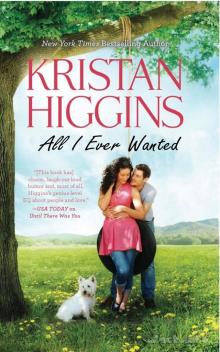 All I Ever Wanted
All I Ever Wanted Until There Was You
Until There Was You On Second Thought
On Second Thought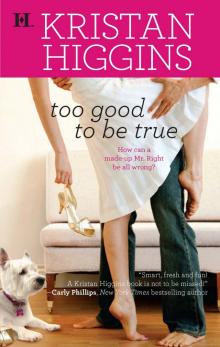 Too Good to Be True
Too Good to Be True My One and Only
My One and Only Fools Rush in
Fools Rush in The Next Best Thing
The Next Best Thing Somebody to Love
Somebody to Love Anything for You
Anything for You Waiting on You
Waiting on You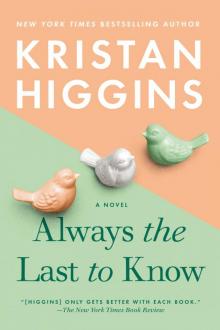 Always the Last to Know
Always the Last to Know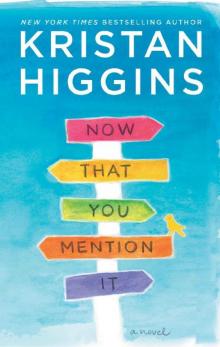 Now That You Mention It
Now That You Mention It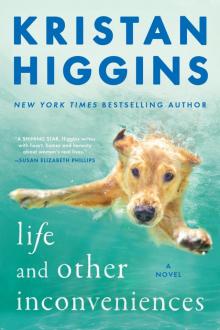 Life and Other Inconveniences
Life and Other Inconveniences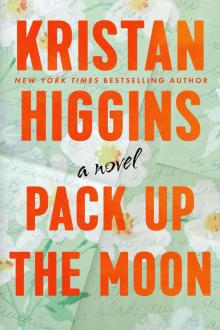 Pack Up the Moon
Pack Up the Moon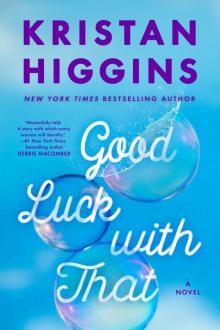 Good Luck with That
Good Luck with That![Blue Heron [2] The Perfect Match Read online](http://i1.bookreadfree.com/i/03/25/blue_heron_2_the_perfect_match_preview.jpg) Blue Heron [2] The Perfect Match
Blue Heron [2] The Perfect Match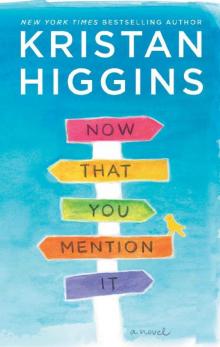 Now That You Mention It: A Novel
Now That You Mention It: A Novel